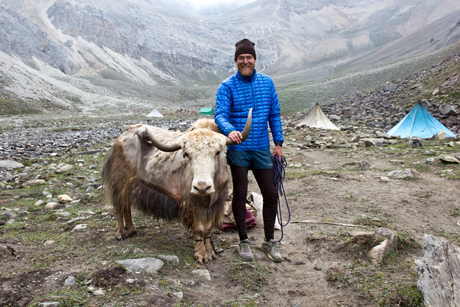Student’s yak research may reduce infection in Nepal
By Stephanie Specchio

Simple changes in food handling, preparation and animal husbandry could have a significant impact on the incidence of zoonotic disease (infections that spread from animals to humans) like brucellosis in people and animals in such countries as Nepal, reports Daniel Jackson, a DVM candidate in Cornell’s Class of 2014, in the January issue of the journal Preventive Veterinary Medicine.
Brucellosis, which is transmitted to people by drinking unpasteurized milk or through close contact with aborted reproductive fluids and tissues, is the most common bacterial zoonotic infection in the world and is endemic to Nepal.
Symptoms in people include high undulating fevers and joint and muscle pain that can persist for years. As a result, brucellosis poses a substantial economic and health burden on Nepal’s herders who seasonally move long distances with their animals, said Jackson.
Despite years of research, neither the distribution nor the economic and public health impact of the disease in Nepal’s mountainous regions had been well characterized, Jackson noted.
Thus, Jackson assessed the burden, prevalence and distribution of brucellosis in domestic yak and their herders in the mountain region of Nepal’s Shey Phoksumdo National Park. With funding from Cornell’s College of Veterinary Medicine’s Expanding Horizons program, which supported field research in Nepal, among other sources, Jackson visited Nepal’s Yak Breeding Station in Syangboche and toured veterinary facilities and colleges in Kathmandu with Nepalese veterinarians and veterinary students. His research provides information that may help to improve the lives of animals and people in the region.
“I am fortunate to be supported by the intellectual and financial resources of Cornell,” said Jackson, who spent a year in Mongolia on a Fulbright fellowship after earning his bachelor’s degree from Oberlin College in 2006. “To make this happen, I tapped into expertise from around the university and dug up old personal connections in Asia. Veterinary services in the northern Himalaya are severely limited, as are sources of funding to support an endeavor like this.”
Jackson’s project involved eight weeks in remote regions of Nepal that required large animal clinical skills, psychological and physical stamina, and a great measure of patience, Jackson said. He walked for approximately 45 days employing a donkey team and a small research team including a guide and translator. His group was self-sufficient, carrying and purchasing supplies as needed while on the move.
“To access herds and herders for my research, we walked about 13 miles per day for seven weeks, mostly above 10,000 feet in elevation,” said Jackson.
As Jackson traveled between villages and encountered yak caravans and grazing herds, he collected blood samples (with the herders’ consent) from nearly 300 yak along the way; conducted physical exams of these animals; and characterized livestock management practices, human/livestock interaction and the prevalence of clinical signs suggestive of human brucellosis in households, all documented quantitatively with a questionnaire.
“In the United States, we are fortunate to have systems in place that reduce the risk of disease transmission,” said Jackson. “In rural Nepal, knowledge about basic food safety and disease transmission is lacking. Small, simple changes based on the identification of risk stand to make a large impact. I am taken by integrative approaches to conservation medicine in Asia that address the role of efficient and safe food animal production systems in the mitigation of poverty, the sustainable use of rangelands, and the promotion of ecosystem health. I hope my research contributes to this body of knowledge while highlighting easy, cheap solutions that improve lives – human and animal.”
Stephanie Specchio is director of communications for the College of Veterinary Medicine.
Media Contact
Get Cornell news delivered right to your inbox.
Subscribe